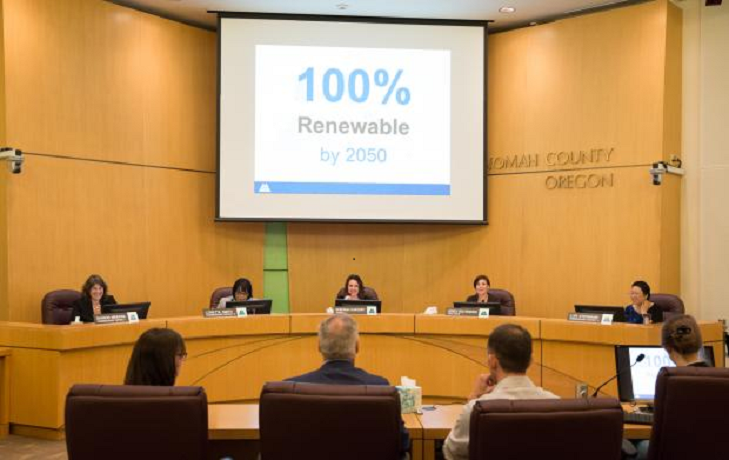
Multnomah County Board votes unanimously for clean energy on June 1. Photo courtesy of Motoya Nakamura/Multnomah County Communications Office
The same day that President Trump withdrew the United States from the Paris Climate Agreement, Portland and Multnomah County partnered to become the first region in Oregon and the Pacific Northwest to commit to 100 percent clean, renewable energy.
On June 1, the City of Portland and Multnomah County, of which Portland is a part, updated their Climate Action Plan and committed to transition all 766,000 residents and all businesses in the county to 100 percent renewable energy sources -- a timely announcement given the abdication of national environmental leadership by President Trump.
As well as committing Portland and Multnomah County to a goal of transitioning to 100 percent clean electricity sources by 2035, the city will transition all energy sectors, including transportation and industry, to 100 percent clean, renewable energy by 2050.
County Commissioner Jessica Vega Pederson introduced the resolution before the Board of Commissioners, which voted unanimously in favor of the commitment. Mere hours later, the Portland City Council took similar action.
Multnomah County has consistently been a leader on climate change, noted John Wasiutynski, director of the county’s Office of Sustainability. “We have never waited for others to take the lead on our behalf,” he said when speaking with The Planet.
While cities such as Portland have frequently taken the lead on environmental action, the importance of leadership on the municipal level is more pressing than ever today. Countrywide, governments from local to state levels are stepping up to say they will remain committed to the goals of the Paris Climate Agreement.
“When our federal leaders abdicate their responsibilities at the local level, we have to step in and take action,” said County Commissioner Pederson to the Oregonian.
In tandem with these clean energy commitments, Portland and Multnomah County will prioritize more community-based renewable energy infrastructure, minority- and women-owned business participation, job training with a focus on career paths in clean energy, transit expansion that includes transitioning to electric buses, and reducing utility rates for low-income residents.
Portland Mayor Ted Wheeler noted in a press statement that it was “one of the longest resolutions ever adopted in the history of the city, but I think it is worthy of that title.” Portland’s resolution makes the point that “a renewable energy transition is an opportunity to redress historical inequities in our community, and must be just. This means, in part, training and hiring people of color and women, who have been underrepresented in ... the workforce needed to implement energy efficiency and a successful renewable energy transition.”
Wasiutynski elaborates, “We are working to ensure that as we make a transition to renewable energy, it be a just transition as well,”
One of the major ways they have worked towards this "just transition" is through the involvement of community groups. The city sought further input from affected groups through their development of a Climate Action subcommittee that will include representatives from Native American tribes and communities of color, low-income residents, youth, environmental advocates, and utility providers.
A remarkable example of community engagement in the renewable energy transition is the June Key Delta Center, a former gas station that has been converted into a green building and community center with the input and assistance of local nonprofits and community groups. Owned and operated by the Portland Alumnae Chapter of Delta Sigma Theta Sorority, the center is a “living building” that aims for the highest environmental level possible, by achieving net-zero energy consumption, stormwater reuse, and implementating equitable hiring practices.
Trump is one of a rapidly dwindling minority of Americans who reject the idea that transitioning to clean energy will yield tremendous environmental and economic benefits. Communities from coast to coast are committing not just to a greener future, but also a more equitable future, by ensuring that the benefits of renewable energy are shared across all communities, particularly those most directly and severely affected by climate change.
It is critical that cities as well as individuals cease to view environmentalism and civil rights as two separate fights, but rather acknowledge that the two go hand-in-hand. The Planet commends the city of Portland, Multnomah County, community partners such as Opal PDX, 350 PDX, Oregon Physicians for Social Responsibility, Verde, Coalition of Communities of Color, and the Sierra Club’s Oregon Chapter for their efforts to work toward a clean and equitable energy future.
Learn more about the action you can take to tell your local leaders to join Portland and nearly a hundred communities across the country making a transition to 100% clean, renewable energy. And add your name to the list of Americans who, along with 194 countries across the world, are committed to the goals of the Paris Agreement, even if President Trump isn't.